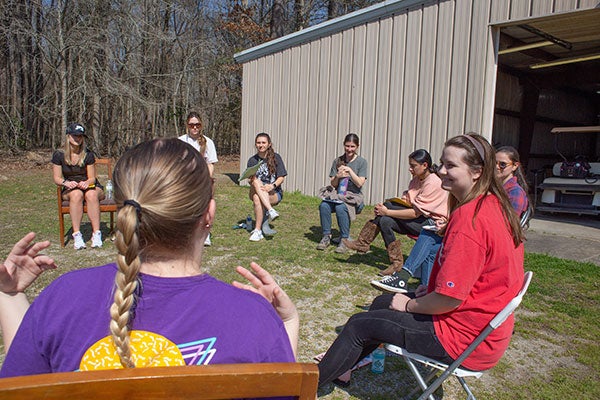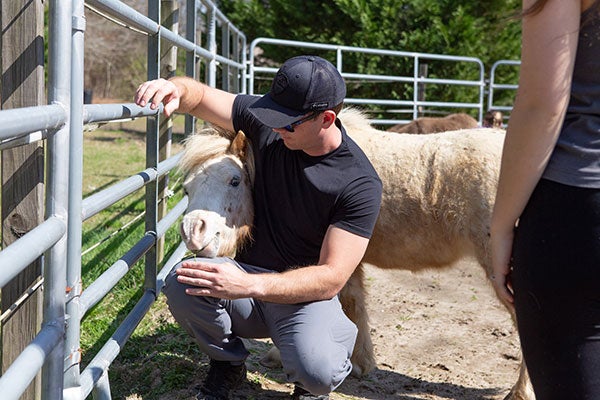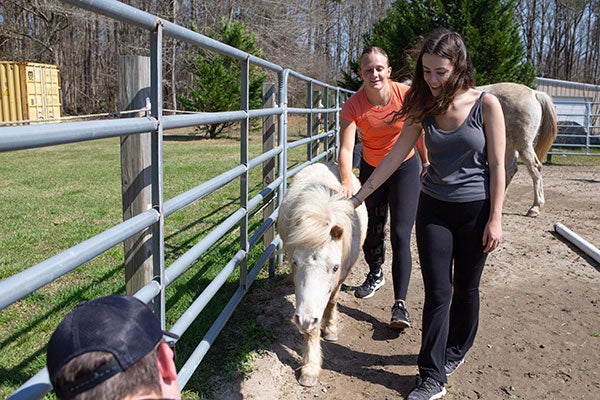Study pairs nursing students with horses to address stress and burnout
East Carolina University College of Nursing students enrolled in third-semester psychiatric and mental health coursework this spring were presented with a unique opportunity: participate in a study on nursing student stress and learn how to better understand their future patients — by interacting with horses.

Psychiatric nurse Susan Lally, also a clinical nursing professor, guides nursing students in a post-horse interaction discussion at Freckles Farm near Ayden. (ECU photos by Benjamin Abel)
Susan Lally, a psychiatric and mental health nurse practitioner and clinical assistant professor, is capitalizing on a program developed at the Orvis School of Nursing at the University of Nevada, Reno, called REAL Intervention Manual (Resilience Equine Assisted Learning).
Dr. Shannon Burleson, an Ovris nursing professor, developed a manual with six key focus areas intended to help nursing students learn how to manage stress levels. Many nursing programs lack “formal resilience training for undergraduate nursing students … Equine-assisted learning interventions promote resilience and decrease stress and burnout in a diversity of populations,” according to the manual.
Lally said she was enthusiastic to implement the program at ECU’s College of Nursing because it showed promise in addressing the increasing levels of stress and burnout in students generally following the COVID-19 pandemic, and the widely reported toll that health care has taken on nurses since 2019.
“They piloted it there and had some really good results that haven’t been published yet. Shannon asked us to partner with her, so this is a pilot study for using that manual to see how the students respond,” Lally explained.
Freckles Farm and Mane Source Counseling in Ayden hosted Lally’s pilot study. The farm-turned-therapy site offers wellness classes, equine assisted psychotherapy and equine assisted learning with horses, donkeys and other farm animals.
“We are working on improving resilience and self-awareness in nursing students to decrease burnout. This is a novel way to introduce psychiatric clinicals on the farm,” Lally said.
Working with hooved assistants provides nursing students with a few hours a week outside of the classroom, in fresh air building community with their peers, and also gives students an opportunity to practice skills necessary to manage patients who present with mental health challenges.

A College of Nursing student interacts with a miniature horse during a study led by clinical nursing professor Susan Lally.
Horses have a special relationship with people, Lally said. As prey animals, they are uniquely sensitive to human intention and emotions, and to have a working relationship with a horse, trust must be established. A horse can’t be forced, it must be lead, Lally said.
“What they also offer is a nonjudgmental awareness and respond in the moment to people, which helps give students the opportunity to reflect,” Lally said. “The students receive feedback from the horse about how their thoughts and emotions impact the connection with another being.”
A similar dynamic exists between psychiatric and mental health patients and their caregivers, Lally said. A gentle hand, and caring heart, can usually achieve what mandates and orders can sometimes fail to do. Often patients with psychiatric concerns aren’t able to clearly articulate their needs.
Nursing student Davina Ahlawat, from Apex, had experience with riding horses before she took the course, but her interaction with the horses she rode was limited to imposing her will on the animal — trying to get it to do what she wanted.
“It’s been nice to interact with the horses and see how they interact with us because we’re getting insights into what they’re thinking,” Ahlawat said.
Julie Webb, a nursing student from Wilmington who wants to work in labor and delivery, had never been around horses and was trepidatious at first, but quickly warmed to being around them.
“Everyone is the same, everyone has feelings and everyone has their bubble. You want the horses to consent when we’re in their bubble,” Webb said. “It’s teaching us really to be aware of everything.”

A nursing student engages with a miniature horse, guided by clinical nursing professor Susan Lally
Webb said she has come to look forward to time at the ranch.
“Nursing school is so stressful, and I don’t ever have a time to just enjoy something that is a hobby, and this is kind of turning into a hobby,” Webb said. “At the same time, it’s a learning opportunity, and relaxation.”
Lally said the parallels between how the students behaved with the horses at the ranch and how they will care for patients at the bedside are obvious — consent and awareness of another being’s response to requests.
“How do we accomplish tasks while being self-aware, regulating our emotions and being aware of who is showing up in front of us,” Lally said. “Are they consenting to do what we are asking them to do? Are we aware of their response?”
Lally said she is pleased with the results she has seen from implementing Burleson’s interventions over the course of the semester. The students, she believes, have benefited greatly from the time outside of the classroom, spending time with friends — those with two legs and four.